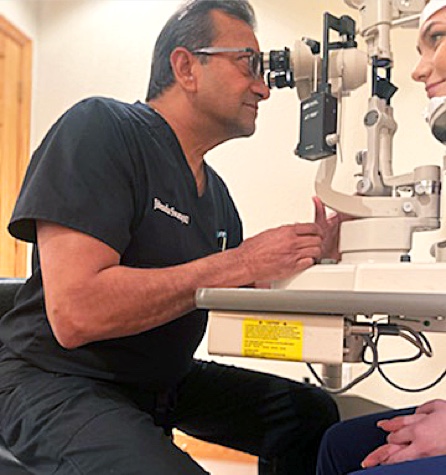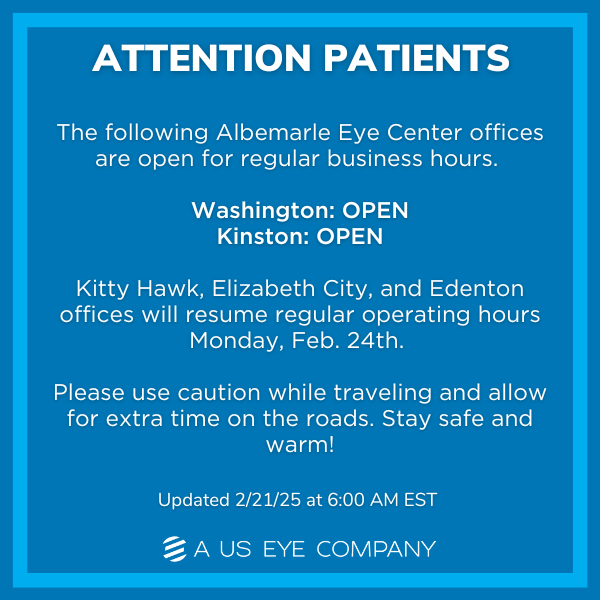While many in North Carolina celebrate the crisp mornings and beautiful leaves that autumn brings, the season also sees a rise in ragweed, mold spores, and indoor dust. If a cataract procedure falls during allergy season, it’s reasonable to wonder how fall allergies and eye surgery might interact. While most people do very well, a few extra steps can ensure recovery is comfortable and predictable.
Cataract surgery: A brief breakdown
During cataract surgery, the cloudy natural lens is removed and replaced with a clear intraocular lens. Most procedures use a tiny incision with ultrasound to soften the lens. Some practices offer laser guidance. Many people return to light activity within a day. Complete healing takes several weeks and follows the surgeon’s plan. Typical instructions include using prescribed eye drops, wearing a shield at night, avoiding eye rubbing, keeping water out of the eyes, and attending follow-up appointments. These basics remain the foundation of all cataract surgery recovery tips.
Common fall allergens in North Carolina
- Ragweed pollen. Often peaks from late summer until the first hard frost.
- Mold spores. Damp leaves, basements, and yard work stir them up.
- House dust and mites. Windows close, HVAC systems run more, and indoor exposure increases.
These triggers do not change how surgery is performed. They can, however, lead to symptoms like itching, tearing, and eye irritation after surgery.
How allergens can affect healing
- Irritation. Allergens can make lids and the eye surface feel itchy or watery. Rubbing is discouraged after surgery because pressure on the lids can disrupt early healing.
- Dryness. Allergic inflammation and indoor heat can thin the tear film. A dry surface feels gritty and can slow comfort gains.
- Inflammation. Uncontrolled flares may prolong redness or light sensitivity, which can blur vision until the surface calms.
Medication allergies are different. Share drug allergies with your surgeon so anesthetics and drops are selected appropriately.

Practical cataract surgery precautions in autumn
While these seasonal steps fit within most post-op plans, you should always follow your surgeon’s instructions first.
- Tell your surgeon about allergies and any medication you use. The plan may include preservative-free artificial tears, an approved anti-allergy drop, or timing adjustments to prevent drops from washing each other out.
- Do not rub. If itching strikes, apply a cool compress with a clean cloth for a few minutes at a time. Keep the protective shield on as directed, especially during sleep.
- Keep the air clean. On high-pollen days, keep windows closed. Change HVAC filters on schedule. A HEPA purifier in the bedroom can reduce overnight exposure.
- Plan outdoor time. Yard work and leaf blowing stir pollen and mold. If possible, delegate early in recovery. If you must be outside, wear wraparound sunglasses and a brimmed hat.
- Refresh the surface. Preservative-free artificial tears can help alleviate dryness caused by both surgery and allergies. Ask your team how to space them around prescription drops.
- Reduce what follows you indoors. Shower or rinse off before bed on high-pollen days. Wash pillowcases frequently. Vacuum with a HEPA-equipped machine and dust with a damp cloth.
- Mind small irritants. Aim fans away from your face. Use the recirculation feature in the car during peak pollen times. Avoid fragranced sprays near the eyes.
- Hydrate and rest. Steady fluids and good sleep support surface comfort as the eye heals—simple, seasonal allergy eye care that helps with day-to-day comfort.
When to contact your eye doctor
Some scratchiness and light sensitivity are expected early on. Call your surgeon’s office promptly if any of the following occur:
- Pain that worsens or is not helped by recommended over-the-counter medicine
- Increasing redness, swelling, or discharge
- New or worsening blurred vision, halos, or a sudden curtain of vision or many new floaters
- Sensitivity to light that escalates rather than improves
- Fever, nausea, or headache with eye pain
Timely checks help the team distinguish between routine healing and issues that require treatment.
Putting it together
Fall allergies do not have to derail a smooth recovery. Most people do well by following post-op instructions and using common-sense avoidance during peak pollen or mold days. Thoughtful planning, clean environments, and good communication with your surgeon support a steady return to clear vision with practical cataract surgery precautions for autumn.
Next steps with Albemarle Eye Center
Planning cataract surgery during allergy season? Albemarle Eye Center’s advanced laser and cataract center helps patients navigate recovery when ragweed, mold, and dust are in the air. Our cataract surgeons review allergy history and medications, confirm which anti-allergy drops are compatible with your post-op regimen, and map follow-ups so you know what to expect day by day. If you’re considering laser cataract eye surgery, your surgeon will also discuss whether a laser-assisted approach is appropriate for your eyes and timeline.
Ready to talk through a fall surgery date or fine-tune a recovery plan around allergies? Request a consultation with our team or call the office to schedule. We’ll outline the procedure, recovery milestones, and practical steps for managing allergens effectively.
FAQs
Do I need to reschedule if my allergies are flaring?
Not always. Many patients recover well in the fall. If symptoms are severe, call the office; the team may adjust the timing or add an allergy-safe drop.
Can allergy eye drops be used right after surgery?
Some are compatible, while others are not. Use only what your surgeon approves, and space any artificial tears so they do not dilute prescription drops.
My eyes feel gritty after surgery. Is that allergies or healing?
Both can contribute. A temporary foreign-body sensation is common in the early stages. Preservative-free tears and cool compresses can help. Report worsening discomfort.
What is the safest way to relieve itching without rubbing?
Use a cool compress on closed lids for brief intervals and keep the shield on as directed. Avoid direct pressure on the eye.
Is outdoor activity okay during pollen season?
Light walks are often fine if your surgeon approves. On high-pollen days, wear sunglasses, skip yard work, and shower before bed to remove allergens.
Which cataract surgery recovery tips matter most in autumn?
Do not rub; use drops exactly as prescribed. Reduce exposure to ragweed, mold, and dust, and keep indoor air clean to minimize eye irritation after surgery.
When should I call about symptoms?
Call if pain increases, vision worsens, redness or discharge escalates, or you notice a sudden curtain of vision or many new floaters. The team will guide the next steps.


















